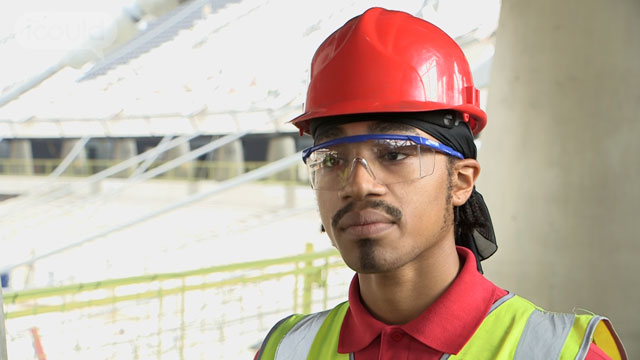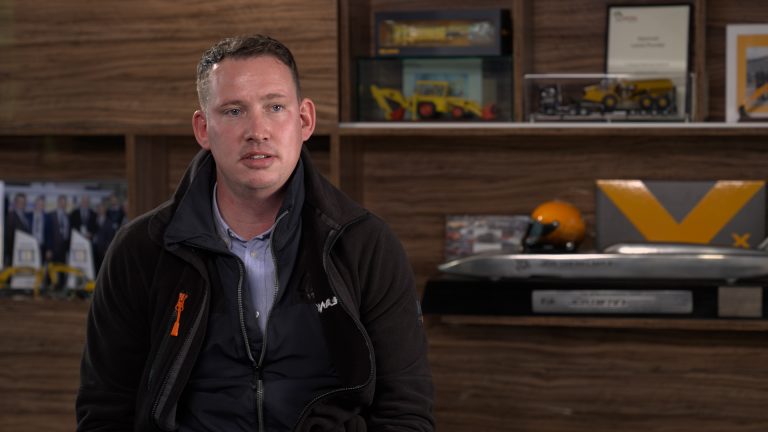Construction Apprentice
Balfour Beatty
info Issues viewing the video?
| Time Code | INTERVIEW WITH APPRENTICES – BALFOUR BEATTY |
| 00:03 | My experience as an apprentice has been pretty sweet. I mean I’ve come on leaps and bounds since I first started. It consists of me learning how to use a station, how to read drawings, how to communicate with the project management team and such. |
| 00:18 | Cos that’s the thing apprenticeship can do for you. It can either guarantee a job when you finish your apprenticeship or when you get your level, your qualification, you’ll be more qualified to be hired by other people. |
| 00:31 | It helped me find my job first of all. It keeps me occupied during the week, gets you money weekly. It’s a good path to go down. Out there it’s not, it’s not easy just to get a job like that. |
| 00:44 | Being an apprentice is, obviously you’re learning and getting money at the same time. |
| 00:53 | My job title at the moment is a trainee engineer, on site, and basically what that consists of is I go out on to site and stake out, according to the coordinates given to me by a surveyor and such the like and then the builders can work to it. |
| 01:08 | I’m ??? and I work for Balfour Beatty. |
| 01:11 | My job entails spreadsheets, booking in deliveries, vehicles and making up signs. |
| 01:20 | My job title is a groundworks apprenticeship. That has different roles. The role that I’m doing is drainage, so living in the ground to lay the pipes, new manholes, new ways for water to get out and stuff like that. |
| 01:37 | The best thing about working here is, well as we all know, it’s a very iconic project. I mean, for years to come, I can say I partook in that, which is awesome. |
| 01:45 | Initially it wasn’t that easy but I could tell you, as time goes on, you fit into the system and it becomes more easier. I sat down and I stood back and I watched, then gradually I got into the system and I can tell you now I’m very happy to everyone in here. |
| 02:06 | Initially, before I started with Balfour Beatty, I was actually working for ??? for a little while, which is a different company. That started roughly a year before this and before that I’d actually gone to college for a while. I’d studied construction in the built environment, Diploma Level 2 initially. I was in two minds. I prefer the more hands on approach, so I done some carpentry work, as well as electrical and some plumbing. Along the lines I did actually get an opportunity to be an apprentice. I’d say, let’s give it a go and ever since I ran with it. |
| 02:39 | Initially I didn’t really like the construction company because I tell you what, I was one of those plumbers, I go ugh, oh no, I can’t do that. But when I came into Balfour Beatty I saw that there was different roles you could do, not only plumbing or electrician or steel erector, you could do a lot of things, like becoming controller. A lot of admin work goes into it but initially, as I say, if you don’t come in and view, you wouldn’t know. So I came in on the line, I got lots of experience and I like to make my career, build up my career in this organisation. |
| 03:23 | An ability to think on your feet, in terms of skills, is required. I’d also say, great people skills, it never hurts, as well as an ability to understand various jobs is very essential. Not just your own, you’d always want to know how a chippy does a job in a certain manner, how you can maybe aid that in your setting out process and so on. |
| 03:46 | You have to be more patient and you’ll be able to listen to people and try to help them out. So you have to be calm and polite. And always the smile, yes. |
| 03:59 | Know that we have a time limit, be able to stick to the time limit and at the same time enjoy work, cos we are here quite often for long hours also, so you’d be advised to enjoy what you’re doing. |
| 04:10 | Yeah, of course you need a sense of humour on the site cos everyone’s older than you, they’re more duller than you, so you’ve got to keep everything energetic and stuff like that. |
| 04:22 | In terms of advice that I’d give the up and coming youth and what I would have probably said to myself when I first started, was know what you want to do now and then create a pathway that you’ve planned to get there. I think one of the biggest issues with me when I first started, was though I knew I wanted to be in construction, I didn’t take the time out to plan my steps and that lack of preparation in the planning had caused me to spend a year or two, you know, feeling out different trades and stuff, when I could have went straight into what I was doing. |
| 04:54` | If you know what you enjoy, run with it. Pick something that can aid you to get there and get there. If you’re not 100% sure, be willing to try things and that’s how you, that’s how I’d say go about it. |
| 05:07 | Literally just read into it, look into what it requires before you do it. Have a practical interview so you see what others are doing, to see if you like it or not. Have a trial if you like it or not and then, if you like it, you’ve got to stick to it, if you don’t find another thing that suits you. You can either go into carpentry, electrician, anything else you want to do. There’s plenty of opportunities out there in an apprenticeship scheme. See what I like, there’s plenty of opportunities out there. I’m still young, go explore. |
| 05:41 | END |
Apprentices talk about what it’s like working for Balfour Beatty.
More information about Assemblers and routine operatives n.e.c.
Data powered by LMI For All
£27,560
average salary
The UK average salary is £29,813
42
average weekly hoursThere are 37.5 hours in the average working week
85%
male
15%
female
The UK workforce is 47% female and 53% male
Future employment
Future employment
Description
Job holders in this unit group perform assembly and routine operative tasks not elsewhere classified in MINOR GROUP 814: Assemblers and Routine Operatives.
Qualifications
There are no formal academic entry requirements, though some employers may require GCSEs/S grades. Some employers may set dexterity and aptitude tests for entrants. Normal colour vision may be required for some posts. NVQs/SVQs at Levels 1, 2 and 3 are available in a variety of areas.
Tasks
- Follows instructions and drawings and positions components on work bench or in assembly machine
- Assembles prepared components in sequence by soldering, bolting, fastening, spot-welding, screwing, nailing, stapling, dipping and fastening using power and hand tools or assembly machine
- Rejects faulty assembly components, inspects finished article for faults, monitors assembly machine operation and reports any faults
- Applies enamel to jewellery and coats, lacquers, dips and touches up articles (other than ceramic)
- Sets up and operates machines to apply colour to wallpaper and to coat articles (other than ceramic) with paint, cellulose or other protective/ decorative material
- Performs miscellaneous painting and coating tasks not elsewhere classified including, staining articles, applying transfers, operating French polishing machines, removing surplus enamel from components and marking design outlines on articles
Employment by region
Top 10 industries for this job
Furniture
3367
Food & beverage services
3240
Specialised construction
2734
Metal products
2334
Rubber & plastic
1994
Motor vehicles, etc
1753
Other non-metallic
1493
Land transport, etc
1411
Retail trade
1257
Employment status
Related career stories
⇦
⇨






